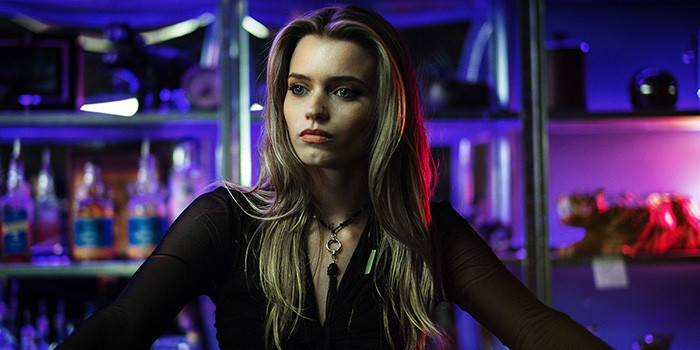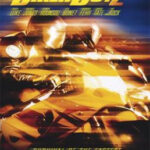When diving into the realm of Biker Gang Movies, comparisons to the behemoth that is Sons of Anarchy are almost unavoidable. Before watching Outlaws, I consciously tried to set aside those comparisons, aiming to judge Stephen McCallum’s film on its own merits. The intention was to avoid viewing it solely through the lens of Kurt Sutter’s iconic series, a cultural touchstone exploring the tragic journey of a man entangled in the criminal underworld. However, from the outset of Matt Nable’s script, it becomes apparent that the film itself might be inviting, even anticipating, such comparisons. Outlaws presents a narrative strikingly similar to Sons of Anarchy: Paddo (Ryan Corr), the “should-be” leader of the Copperheads Motorcycle Club, strives to legitimize their operations, while Knuck (Nable himself), the club’s president, returns from prison with a thirst for violence, reigniting internal conflict. This core tension mirrors the central drama of Sons, making the comparison almost inescapable.
Of course, Sons of Anarchy, as a television series, benefits from a significantly larger canvas. Its extended runtime allows for nuanced character development, the establishment of intricate motivations, and the careful construction of plotlines that unfold over seasons. Outlaws, constrained to a mere ninety minutes, struggles to achieve the same depth. The supposed father-son dynamic between Knuck and Paddo, crucial to their conflict, feels underdeveloped, conveyed through a single, almost throwaway line. This revelation arrives precisely when their ideological rift has become irreparable, making it difficult to believe they ever shared any genuine camaraderie. Perhaps three years of separation is an eternity in the volatile world of a biker gang. It seemingly hardened Knuck, fostering paranoia and a sense of threat from his protégé, while Paddo became acutely aware of Knuck’s brutal, outdated approach to leadership, lacking any real business acumen necessary for the club’s survival in a changing world.
One area where Outlaws particularly stumbles when placed against the backdrop of other biker gang movies, especially Sons of Anarchy, is in its portrayal of female characters. While Sons offered complex female figures like Gemma Teller Morrow, whose maternal influence and intricate manipulations drove much of the narrative, Outlaws presents Hayley (Simone Kessell), Knuck’s wife, and Katrina (Abbey Lee), Paddo’s girlfriend, in a far less nuanced light. Hayley lacks Gemma’s maternal connection to the younger generation and the resulting internal conflict. Katrina is not an outsider attempting to pull her lover away from a life of crime, like Tara Knowles in Sons. Instead, these women are depicted as largely devoid of compassion, empathy, or any aspiration beyond seizing control. Hayley actively poisons Knuck’s mind against Paddo, while Katrina pushes Paddo towards a violent power grab.
They are undeniably intelligent in their machinations, and the film hints at their long-term manipulation, striving to portray them as masterminds behind the unfolding chaos. However, this ambition falters because the film relies heavily on tired, sexist biker gang stereotypes. These women are not given the space to breathe as fully realized characters; they remain clichés. The script even introduces Paddo’s simple-minded brother, Skink (Josh McConville), seemingly solely to escalate the conflict between the old guard and the new. Skink becomes a puppet, acting on the women’s suggestions while the more thoughtful men within the club grapple with their consciences.

A dramatic scene from Outlaws, a biker gang movie that explores the dark side of motorcycle club brotherhood and betrayal.
Consequently, Outlaws doesn’t subvert the machismo often associated with biker gang movies; it reinforces it. Paddo and Knuck seem to hesitate before crossing certain lines with each other, perhaps recognizing the devastating consequences of sacrificing brotherhood for the influence of women. Skink, the film’s designated fool, becomes the catalyst for the escalating violence that Katrina and Hayley orchestrate. This character, existing seemingly only to create trouble, becomes pivotal to the plot. The film, through Skink and Noisy (Sam Parsonson), oddly equates sensitivity with naiveté, further contributing to its problematic portrayal of masculinity.
Beyond the pervasive misogyny that reduces Katrina and Hayley to stereotypical sirens, wielding love as a tool for power, Outlaws also incorporates a troubling layer of homophobia. It is revealed that Knuck had same-sex encounters in prison, but this revelation is not explored for meaningful commentary. Instead, it reinforces a toxic notion of masculinity, where Knuck’s rage is somehow amplified by this suppressed aspect of his identity. The film doesn’t use this subplot to explore Knuck’s inner turmoil or the complexities of identity within the hyper-masculine biker gang world. Instead, it portrays his same-sex affair as somehow more reprehensible than other forms of betrayal, implying a moral judgment rooted in homophobia.
One might argue this portrayal is “realistic” within the context of a fictional motorcycle club and its characters. However, depicting reprehensible behavior does not automatically make a film insightful or socially relevant. There remains a sense of glorification associated with the biker lifestyle, a cinematic romanticization of criminality. By showcasing these characters, both men and women, manipulating and undermining each other in a power struggle, while simultaneously foregrounding homophobic undertones, Outlaws sends a muddled message. It fails to adequately address the inherent conflict between showcasing “brotherly love” within the club and portraying homosexuality as a form of betrayal. Outlaws essentially conflates homosexuality with treachery without offering any counter-narrative or nuance.
Is Outlaws technically competent? In some respects, yes. Certain scenes, like the tense opening confrontation between Paddo and Sugar (Aaron Pedersen), the leader of a rival gang, are engaging, even if plot threads, like the initial threat to Skink, are later dropped. Lee and Kessell deliver solid performances, despite their characters’ two-dimensionality. Corr and Nable are also effective as men grappling with internal conflicts and external pressures, although their characters often seem defined by their allegiance to the club above personal conviction. Ultimately, Outlaws lacks the depth and nuanced exploration necessary to resonate beyond a niche audience already immersed in the world of motorcycle clubs and crime. Without a deeper exploration of its characters’ internal struggles and the problematic themes it touches upon, Outlaws is unlikely to appeal to viewers beyond those already predisposed to hard-drinking, skull-cracking biker gang movies.
Outlaws had a limited release starting February 1st.
Grade: C-

